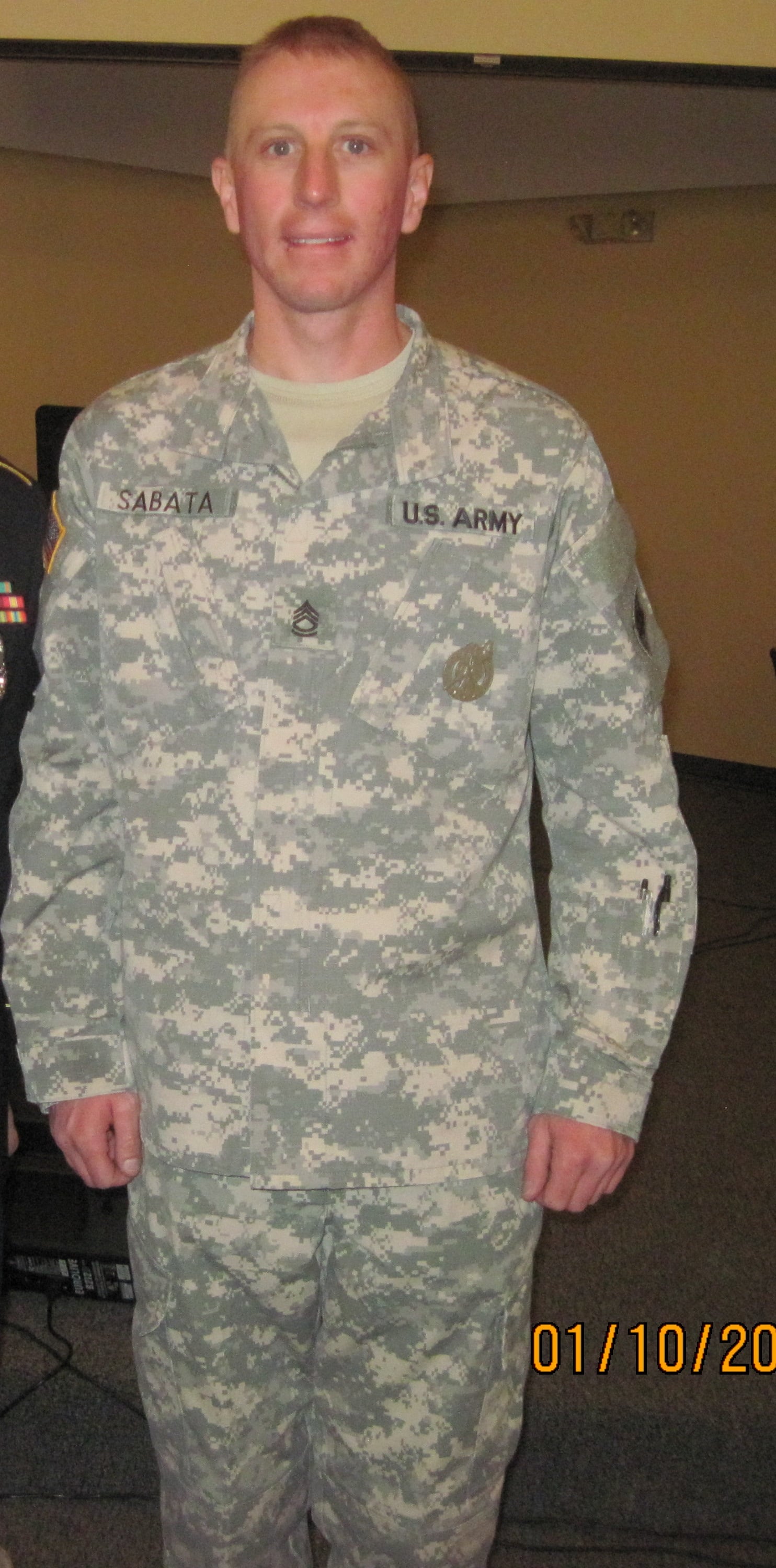By all accounts, he is an exceptional soldier. His NCO evaluation reports glow with praise. For three years, he excelled in one of the service's most thankless jobs: recruiting. He advanced to E-7 in just 10 years; it takes a typical soldier 13-14 years to do that.
The Army has stiff-armed Sabata's appeals to stay in service. Though backed by peers and supervisors, Sabata alleges his leadership has done next-to-nothing to help him. And the NCO, whose doctor says "lives and breathes Army values," believes his beloved service has failed him. Facing impending separation, he saw only one remaining recourse: share his story.
"I'm trying to put myself into a situation where I can still help the Army out," Sabata told Army Times. "I still have a passion to help the soldiers, help with motivation. I have the will to still serve in the Army. It's ridiculous how they're treating me."
"My meat and potatoes was going out to the high schools. I loved every minute of it," said Sabata. "It's all about taking care of the soldier and helping the individual out. That's what being an NCO is all about."
"Above all, the Army strives to provide the best care for our soldiers through polices which balance the readiness needs of the Army with compassionate and equitable treatment for each individual," Platt said.
Policy doesn't provide clear-cut direction in Sabata's case. Army Regulation 40-501, Standards of Medical Fitness, says that soldiers with Crohn's Ddisease should be referred to a Medical Evaluation Board "except when responding well to treatment." The regulation says that drugs like the immunosuppressant Sabata has taken since 2011 "may render an individual non-deployable," but does not state that it renders the soldier unfit or necessitates a MEB.
says that soldiers with Crohn's Ddisease should be referred to a Medical Evaluation Board "except when responding well to treatment." The regulation says that drugs like the immunosuppressant Sabata has taken since 2011 "may render an individual non-deployable," but does not state that it renders the soldier unfit or necessitates a MEB.
The diagnosis
While deployed in Iraq in 2006, Sabata went in for a physical to enter the Green to Gold program (a path for enlisted soldiers to earn a commission). He said he had no cause for concern. But the exam uncovered bleeding in his digestive tract, and he was sent to Balad Air Base ((now JB Balad Air Base but wasn't "Joint" then)) for monitoring.
((now JB Balad Air Base but wasn't "Joint" then)) for monitoring.
Sabata had attributed his only symptom to that point, weight loss, to the Iraq heat. But one medical provider at Balad saw it as a clue indicating he might have Crohn's disease. His post-deployment medical exam confirmed the theory with a diagnosis.

Sgt. 1st Class Kevin Sabata would like to be a career recruiter.
Photo Credit: Courtesy Kevin Sabata
Sabata said his most problematic symptom, abdominal pain, emerged shortly after the diagnosis, albeit sporadically.
"It was like a vice grip clamping down on my insides," Sabata said.
Treatment can greatly reduce symptoms and even bring about long-term remission, the Mayo Clinic says. Sabata said treatment did just that; he said at worst he had to go home early a few times a year.
Like many strong recruiters, he struggled at first but then found his niche. He reveled in getting to know students: he'd eat lunch, attend sporting events and work out with them. His low-pressure tactics produced results. His center commander recommended his transition to recruiting in a letter of recommendation in which he called Sabata his "number one producing Recruiter."
Just before getting to Carson, his body started reacting poorly to his medication. A doctor instead prescribed an immunosuppressant. The stronger drug inhibits the body's ability to heal and fight illness.
The whole time at Carson, he said, he was trying to reclass to 79R, without success.
Last chance
If approved to reclass, Sabata might have gotten his 79R wish. The Army typically has vacancies in that job and has gone so far as to offer automatic promotions for staff sergeants willing to reclass.
"He told me that I'm an E-7 with 11 years served, and he wasn't going to do a MAR2," Sabata said. "And he said that I should be med-boarded out of the Army."
Sabata didn't understand; to him, he remains as fit to serve as he has been for years. He objected to doctors and appealed to commanders, but he said they routinely shrugged and parroted back that he was non-deployable.
Near the end of August, the MEB determined him unfit for retention, regardless of MOS.
Sabata formally appealed through a number of steps. But after initiation of a MEB, the Army is unable to entertain reclass possibilities, Platt confirmed, unless Sabata were to be determined fit for retention. Platt said medical retention decisions are based "on standards of medical fitness to maintain a fit fighting force to best meet the needs of the Army."
Was he screwed over?
Ret. Lt. Col. Michael Parker, a veterans advocate who has worked for several years representing service members seeking disability ratings, said Sabata's timing — during a draw-down — probably didn't help matters.
Some of the MEB definitions for medical unfitness leave some room for discretion. The Army, he said, has leeway to shape its force by leaning one way or another.
"There can be different rules for different people. There's still quite a bit of slop and inconsistency that can screw over a troop. You run into subjective criteria," said Parker. "Now is not a good time, because they're trying to reduce forces all across the board."
Sabata received a 30 percent disability rating from the Army, 70 percent from the Department of Veterans Affairs. He is grateful that he won't be forced out completely empty-handed. Soldiers with an Army disability rating less than 30 percent receive a one-time severance of about $35,000. He will receive an additional $1,330 per month for life.
But he also disputes the Army's determination that his condition is not combat related. He argues the fact he worked near burn pits in Iraq may have caused his medical ailments. VA acknowledges on its website that burn pits could impact a soldier's gastrointestinal tract, but adds that more research is necessary to determine potential long-term health effects.
Sabata does not see any reason he shouldn't have an opportunity to continue serving the Army — in a high-demand job he's well-suited to perform.
"It would truly be a loss to the United States Army if this Sergeant was forced out of the Army," Birchfield wrote.




